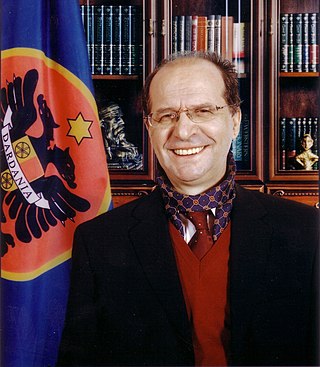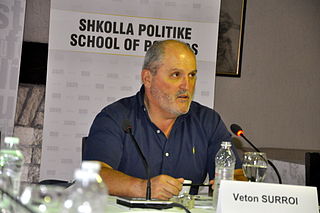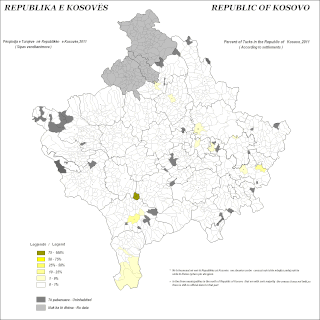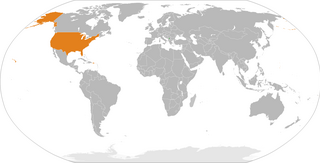
Flora Brovina is a Kosovar Albanian poet, pediatrician and women's rights activist. She was born in the town of Skenderaj in the Drenica Valley of Kosovo, and was raised in Pristina, where she went to school and began studying medicine. After finishing her university studies in Zagreb, where she specialized in pediatrics, she returned to Kosovo and worked for a time as a journalist for the Albanian-language daily newspaper Rilindja. Soon thereafter, she returned to the health care profession and worked for many years in the Pediatrics Ward of the Pristina General Hospital.

Ibrahim Rugova was a Kosovo-Albanian politician, scholar, and writer, who served as the President of the partially recognised Republic of Kosova, serving from 1992 to 2000 and as President of Kosovo from 2002 until his death in 2006. He oversaw a popular struggle for independence, advocating a peaceful resistance to Yugoslav rule and lobbying for U.S. and European support, especially during the Kosovo War.
Music of Kosovo is music that originates from Kosovo, a country in the Balkans. Kosovo's population is mainly Kosovo Albanians, also known as Kosovars, and there are various minority ethnic groups as well. Kosovan music is closely related to that of neighbouring Albania, as well as to that of countries in the former Yugoslavia.

Veton Surroi is a Kosovar Albanian publicist, politician and former journalist. Surroi is the founder and former leader of the ORA political party, and was a member of Kosovo assembly from 2004 to 2008.

Adem Jashari was one of the founders of the Kosovo Liberation Army (KLA), a Kosovo Albanian separatist militia which fought for the secession of Kosovo from the Federal Republic of Yugoslavia during the 1990s.

Lëvizja Vetëvendosje (LVV) is a left-leaning social democratic political party in Kosovo. It is a member of the Progressive Alliance, and an observer in the Party of European Socialists, and the Socialist International.

The University of Pristina is a public university located in Pristina, Kosovo. It is the institution that emerged after the disestablishment of the University of Pristina (1969–1999) as a result of the Kosovo War. The inauguration of the university was a historical occurrence not only for the people of Kosovo, but for the whole Albanian nation. On 15 February, the solemn Parliament session took place, which is also proclaimed as The University of Pristina's Day. In the composition of the newly established University of Pristina were faculties with their headquarters in Pristina: the Faculty of Philosophy, Faculty of Law and Economics, Faculty of Engineering and Faculty of Medicine. Now the University of Pristina has 17 faculties, of which 14 are academic faculties and 3 are faculties of applied sciences. Contained within the emblem is a translation of the name into Latin, Universitas Studiorum Prishtiniensis.
Akil Mark Koci is a Kosovar Albanian composer and music writer.

The Constitution of Kosovo is the supreme law of the Republic of Kosovo, a territory of unresolved political status. Article four of the constitution establishes the rules and separate powers of the three branches of the government. The unicameral Assembly of the Republic exercises the legislative power, the executive branch led by the President and the Prime Minister which are responsible for implementing laws and the judicial system headed by the Supreme Court.

Turks in Kosovo, also known as Kosovo Turks or Kosovan Turks, are the ethnic Turks who constitute a minority group in Kosovo.

Kosovo was officially recognized as a country by the United States on February 18, 2008, one day after Kosovo declared its independence from Serbia.

Lesbian, gay, bisexual, and transgender (LGBT) rights in Kosovo have improved in recent years, most notably with the adoption of the new Constitution, banning discrimination based on sexual orientation. Kosovo remains one of the few Muslim-majority countries where LGBT pride parades are held annually.
Enver Hasani was the president of the Constitutional Court of Kosovo.
Avni Spahiu is a Kosovar diplomat and former television director. During the period between 2008 and 2012 he served as ambassador to the United States. He was the Republic of Kosovo's ambassador to the Republic of Turkey from 2012 to 2019.

Muhamet Hamiti is a Kosovar politician, formerly an advisor to historic President of Kosovo, Dr. Ibrahim Rugova. He is ambassador of the Republic of Kosovo to London and non-resident Ambassador to New Zealand and Ireland.

Kosovo unilaterally self proclaimed independence from Serbia in 2008, a move which Serbia strongly rejects. Serbia does not recognize Kosovo as an independent state and continues to claim it as the Autonomous Province of Kosovo and Metohija. However, differences and disputes remain, while North Kosovo is partially under Serbian rule. Initially there were no relations between the two; but in the following years there has been increased dialogue and cooperation between the two sides.

Kosovo–Saudi Arabia relations are foreign relations between the Kosovo and Saudi Arabia. Like Saudi Arabia, Kosovo has a mainly Muslim population.

The passport of Kosovo is a travel document that is issued by the Interior Ministry of Kosovo to the citizens of Kosovo to enable them to travel abroad. The passports are also used as proof of identity within the country, along with the national identity card.

The University of Pristina was founded in the Socialist Autonomous Province of Kosovo, Socialist Republic of Serbia, Yugoslavia, in the city of Pristina, for the academic year 1969–1970 and functioned until 1999. However, owing to political upheaval, war, successive mutual expulsions of faculty of one ethnicity or the other, and resultant pervasive ethnic-based polarisation, there came to be two disjoint institutions using the same name, albeit idiosyncratically to reflect ethnic identity. Albanian-language activity continues at the original location, whilst the Serbian-language University of Priština has relocated to North Mitrovica, where it maintains its place within the Serbian education system.
Kosovar civil society has had many incarnations since the early 1990s. It is a product of the occupation of the Kosovo province by the Socialist Federal Republic of Yugoslavia through 1999, then expanded when the Republic of Kosovo was under UNMIK and KFOR control, and now how it has evolved since the unilateral declaration of independence on February 17, 2008. It consists of the former civil society organizations from before the 1999 conflict, the local NGOs that came about post conflict, and the international NGOs that have either dispersed money or opened local branches within Kosovo.















